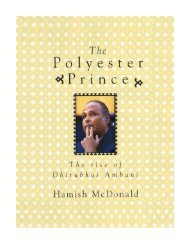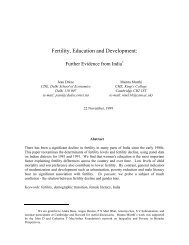You also want an ePaper? Increase the reach of your titles
YUMPU automatically turns print PDFs into web optimized ePapers that Google loves.
his advice to ‘Keep out under all circumstances until 15th August’. <strong>The</strong>n, on the day<br />
of the transfer of British power, the Government of Junagadh announced its<br />
accession to Pakistan. Hodson believes Jinnah never actually thought Junagadh<br />
would be allowed to join Pakistan. <strong>The</strong> objective of the exercise was to set<br />
uncomfortable precedents for Nehru in the more pressing contest for Kashmir and<br />
perhaps Hyderabad. If Nehru agreed to a plebiscite in Junagadh, which he eventually<br />
did, it would help Pakistan’s case for a popular vote in Muslim-majority Kashmir. If<br />
the Junagadh ruler’s decision was accepted, over the wishes of his people, the same<br />
could apply in Hyderabad. If the Indians simply marched into Junagadh, protests<br />
against a similar Pakistan, use of force in Kashmir would be greatly weakened. Nehru<br />
adopted the course of negotiation while throwing a military noose around Junagadh<br />
in the neighbouring Hindu-ruled states, which had all acceded to India. Two subordinate<br />
territories of Junagadh, the enclaves of Babariawad and Mangrol, were<br />
taken by Indian troops on 1 November 1947 without bloodshed.<br />
Meanwhile, Indian nationalists began agitating within and without Junagadh for the<br />
overthrow of the Nawab. In Bombay on 25 September, they declared an Arazi<br />
Hakumat or Parallel Government under the presidency of Samaldas Gandhi, a<br />
relative of Gandhi who was editor of the newspaper Vande Mataram. From a<br />
temporary base in Rajkot, Gandhi kept in touch with supporters inside Junagadh by<br />
human couriers simply walking across the open frontiers of the isolated state. Other<br />
nationalist journalists, including the editors of the Gujarati newspaper janmabhoomi<br />
in Bombay, called for volunteers to gather in Bhavnagar and other cities close to<br />
Junagadh for a non-violent invasion.<br />
<strong>The</strong> students in the Junagadh Vidyarti Sangh threw their limited weight against the<br />
Nawab also. ‘we were too scared to carry out physical sabotage like attacking power<br />
stations,’ said Vakharia. ‘our sabotage consisted of spreading false rumours to cause<br />
panic, and supplying information back to the provisional government. We used to<br />
send someone to Jetalsur or Jedpur in the Indian union to pass on the information.<br />
In Junagadh, as in many other parts of India, the partition steadily developed a<br />
murderous communal nature. Two Muslim communities, called the Sodhana and<br />
Vadhana, had taken a militant position in support of accession to Pakistan and<br />
mounted big pro-cessions through Junagadh, threatening Hindus with retribution if<br />
they opposed it. As it became clear that Pakistan was in no position to support the<br />
Nawab, Hindus turned on the Muslim minority and massacred whole communities in<br />
some outlying villages.<br />
Food shortages developed, and the Nawab’s revenues dried up. As his administration<br />
lost its grip, the Nawab decided the game was up and made a hasty departure for<br />
Karachi, taking with him all the cash and negotiable assets of the treasury, his family<br />
and many of his dogs (though his consort, the Begum, forgot her youngest child in<br />
the royal nursery and had to turn back to collect the infant). On 8 November, after<br />
an earlier meeting of the State Council, Bhutto wrote to the Indian Government’s<br />
representative at Rajkot asking India to take over the state to avoid a complete<br />
administrative break down, pending a honourable settlement of the accession issues.<br />
<strong>The</strong> Indian Army moved into Junagadh without incident on 9 November, and the<br />
communal tension quickly settled down. However, Vakharia recalls a small communal<br />
riot breaking out in Junagadh soon after independence, when some shoe shops<br />
belonging to Muslims at Panch Hatadi (Five Shops Area) were looted by Hindus. <strong>The</strong><br />
students of the Junagadh Vidyarti Sangh went to the area to protect the Muslim<br />
shops, but their presence was misunderstood by the police.




